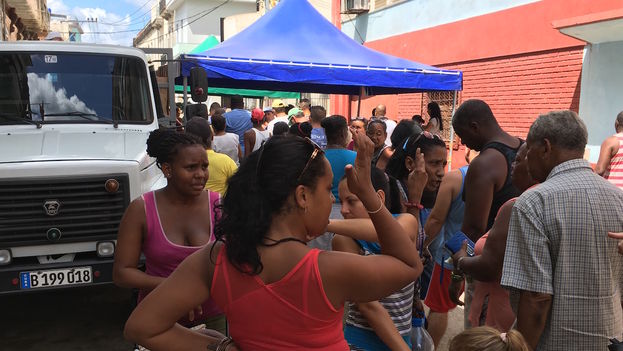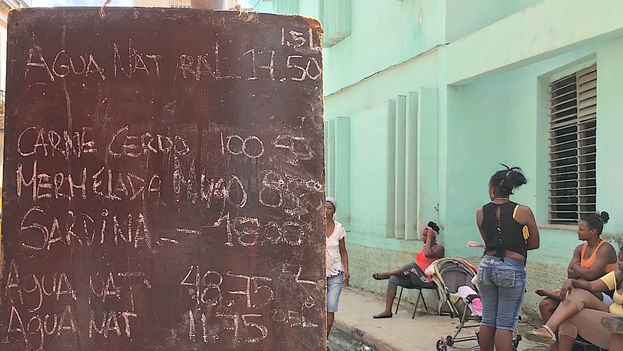
![]() 14ymedio, Zunilda Mata, Havana, 14 September 2017 – In Cuba’s capital city dozens of victims of Hurricane Irma surround an improvised kiosk clutching plastic bowls and bottles. The authorities have set up several stands that offer soup, rice with a protein and bottled water to anxious residents.
14ymedio, Zunilda Mata, Havana, 14 September 2017 – In Cuba’s capital city dozens of victims of Hurricane Irma surround an improvised kiosk clutching plastic bowls and bottles. The authorities have set up several stands that offer soup, rice with a protein and bottled water to anxious residents.
With prices of 2 Cuban pesos (CUP) for the ration of soup, and 8 CUP for a little box with rice and some meat and vegetables, the kiosks in different places are selling food prepared for the victims. However, the complaints are growing in the face of a distribution that many consider should be done at no cost.
“I don’t have a single centavo, I spent everything I had buying cookies and candles before the hurricane and now I don’t have anything,” laments Coralia, a resident of Marques Gonzales Street who was heading to La Inmaculada Church on San Lazaro Street this Wednesday, looking for help.
The mark left on the city by the sea is still visible on the facades of Lagunas Street, near Belascoain, one of the areas where the floods in Havana did the most damage. But these stains are only the visible marks of the drama. The most difficult effects are evident inside the houses, with the lack of water and shortage of food.
“This morning I ate the last egg I had left, which had miraculously survived because it was unrefrigerated for more than three days,” Eneida, a retiree of 73 told 14ymedio. “I have nothing left and I do not have the money to buy what the government is selling,” she says.
La Inmaculada, a centrally located church, lost its imposing and emblematic main doors under the force of the waves that poured over the wall of the Malecon. Since the winds stopped blowing dozens of parishioners and neighbors have come asking for some food and clothing, but the chapel is simply not equipped.

Rosario, the chapel receptionist describes the situation as “terrible.” “We have no water, the dining room where we normally serve food to about 25 elders from the area has not been able to function for several days and these people can not even get here because of the ongoing conditions in the neighborhood,” she says.
“Through the side gate we are collecting donations of any kind: clothes, food and kitchen equipment, because there are people here who have lost everything,” the woman emphasizes. Other churches are also mobilizing to alleviate what is taking shape as a humanitarian drama. “Many people are arriving in a very complicated situation,” Rosario says.
In the midst of these shortages, between Tuesday and Wednesday Cuba received 10 tons of humanitarian aid from Venezuela in the form of non-perishable food, medicines and drinking water, as well as another 2.2 tons chartered by plane from Panama, which mainly contains hygiene and food items.
One of the blue tents set up by the island’s authorities to sell food is just a few steps away from the well-known funeral home at Calzada and K Streets in Vedado. The residents of the lower floors and the improvised structures in the old semi-underground parking areas were the most harmed in that area, which is along the low part of the coast where the sea advanced several blocks and left significant damage in numerous houses.
Among them is Yazmín, the mother of two children and a worker for a state company. “In my house nothing is left that is usable, all the furniture got wet and my children lost even their school books,” she laments.
Yazmín had hoped that schools would resume classes on Thursday to “see if they offer food more cheaply,” but the schools in the area have delayed opening their doors until Monday. “With the children I do not have much mobility and we will have line up for a bit of soup,” she said, resigned.

In Ánimas Street in the San Leopoldo district, another kiosk is selling a similar menu. Dozens of people wait in line to take home the first serving of hot food they will have eaten since last Saturday. Water is also for sale at 11.75 CUP a pint or 48.75 CUP for a 5 quart bottle, a price that those affected by Hurricane consider excessive.
“How can they be selling water? I do not understand that they do not distribute all this for free because they know that the people of this neighborhood don’t even have a pot to piss in,” complains Rigoberto Núñez, a 57-year-old neighbor whose water tank has been contaminated. Among the personal items he lost with the flooding was his wallet, he says. “I do not know if I lost it or if it was stolen, but now I do not have a single centavo,” he adds.
A can of sardines at the kiosks cost 18 CUP, the equivalent of a day’s wages for a state employe, while ground beef is 65 CUP a pound, an amount most people can’t pay.
While people waited in line on Thursday to buy a serving of food – limited in quantities to “avoid hoarding,” says one of the employees who sells it – the rumor spread that the Church of La Caridad in Manrique is helping with medicines and some milk to those most affected.
In a stampede, some leave in the direction of the chapel in search of those resources that have now become the greatest obsession for thousands of the storm’s victims.
